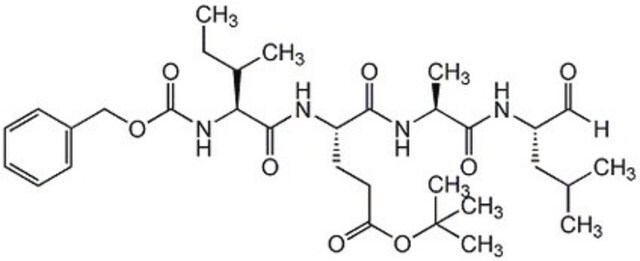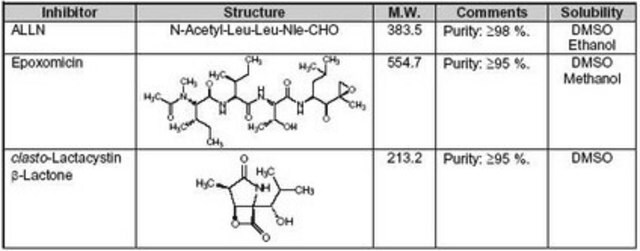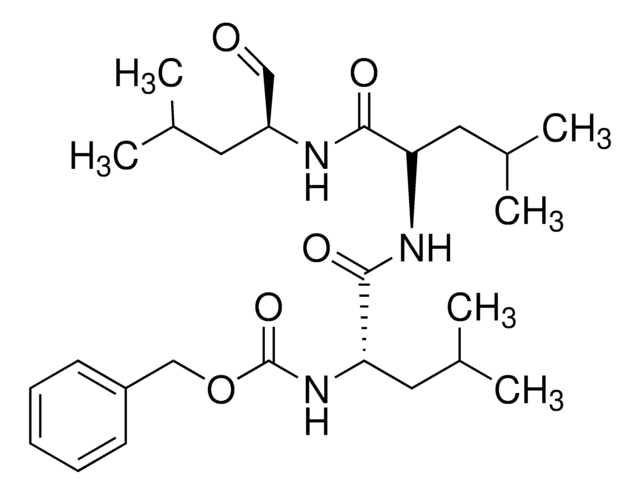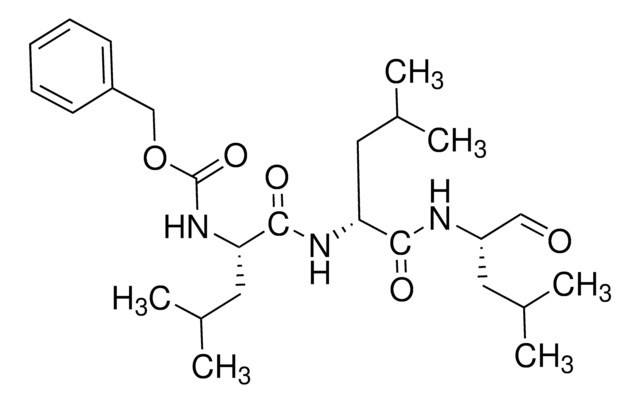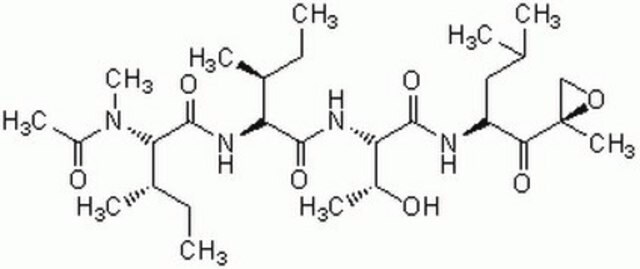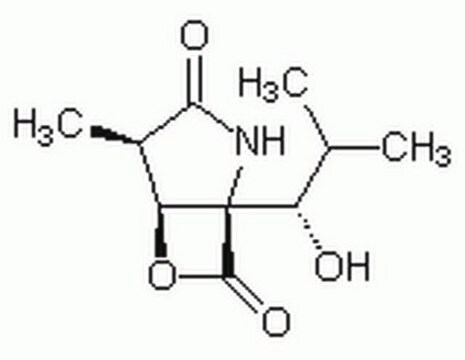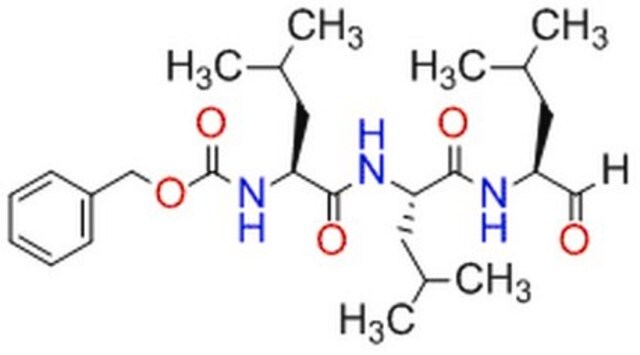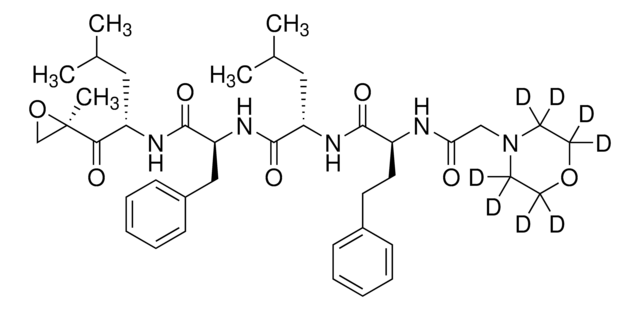539164
Proteasome Inhibitor Set I
The Proteasome Inhibitor Set I controls the biological activity of Proteasome. This small molecule/inhibitor is primarily used for Protease Inhibitors applications.
Autenticatiper visualizzare i prezzi riservati alla tua organizzazione & contrattuali
About This Item
Codice UNSPSC:
12352200
NACRES:
NA.77
Prodotti consigliati
Livello qualitativo
Forma fisica
solid
Produttore/marchio commerciale
Calbiochem®
Condizioni di stoccaggio
OK to freeze
Condizioni di spedizione
ambient
Temperatura di conservazione
−20°C
Descrizione generale
Proteasomes are large multi-subunit protease complexes, localized in the nucleus and cytosol, which selectively degrade intracellular proteins. They play a major role in the degradation of many proteins involved in cell cycling, proliferation, and apoptosis. A vast majority of short-lived proteins are degraded by the ubiquitin-proteasome pathway. A protein marked for degradation is covalently attached to multiple molecules of ubiquitin (Ubq), a highly conserved 76-amino acid (8.6 kDa) protein, which escorts it for rapid hydrolysis to the multi-component enzymatic complex known as the 26S proteasome. The proteolytic core of this complex, the 20S proteasome, contains multiple peptidase activities and functions as the catalytic machine.
The ubiquitin-proteasome pathway plays a major role in the breakdown of abnormal proteins that result from oxidative stress and mutations that might otherwise disrupt normal cellular homeostasis. The reactive oxygen species can promote partial unfolding of the proteins, exposing its hydrophobic domains to proteolytic enzymes of the 20S complex. Rapid degradation of defective enzymes, as seen in diseases caused by metabolic abnormalities, also occurs in the proteasome. The Ubq-proteasome pathway has also been implicated in several forms of malignancy, in the pathogenesis of several genetic diseases, and in the pathology of muscle wasting. It is also involved in the destruction of proteins that participate in cell cycle progression, transcription control, signal transduction, and metabolic regulation.
The ubiquitin-proteasome pathway plays a major role in the breakdown of abnormal proteins that result from oxidative stress and mutations that might otherwise disrupt normal cellular homeostasis. The reactive oxygen species can promote partial unfolding of the proteins, exposing its hydrophobic domains to proteolytic enzymes of the 20S complex. Rapid degradation of defective enzymes, as seen in diseases caused by metabolic abnormalities, also occurs in the proteasome. The Ubq-proteasome pathway has also been implicated in several forms of malignancy, in the pathogenesis of several genetic diseases, and in the pathology of muscle wasting. It is also involved in the destruction of proteins that participate in cell cycle progression, transcription control, signal transduction, and metabolic regulation.
Azioni biochim/fisiol
Primary Target
MPC
MPC
Secondary Target
NF-κB activity
NF-κB activity
Attenzione
Toxicity: Standard Handling (A)
Altre note
Grimm, L.M., et al. 1996. EMBO J.15, 3835.
Griscavage, J.M., et al. 1996. Proc. Natl. Acad. Sci. USA93, 3308.
Lee, D.H., and Goldberg, A.L. 1996. J. Biol. Chem.271, 27280.
Oda, K., et al. 1996. Biochem. Biophys. Res. Commun.219, 800.
Fenteany, G., et al. 1995. Science268, 726.
Traenckner, E.B., et al. 1994. EMBO J.13, 5433.
Griscavage, J.M., et al. 1996. Proc. Natl. Acad. Sci. USA93, 3308.
Lee, D.H., and Goldberg, A.L. 1996. J. Biol. Chem.271, 27280.
Oda, K., et al. 1996. Biochem. Biophys. Res. Commun.219, 800.
Fenteany, G., et al. 1995. Science268, 726.
Traenckner, E.B., et al. 1994. EMBO J.13, 5433.
Note legali
CALBIOCHEM is a registered trademark of Merck KGaA, Darmstadt, Germany
Codice della classe di stoccaggio
11 - Combustible Solids
Certificati d'analisi (COA)
Cerca il Certificati d'analisi (COA) digitando il numero di lotto/batch corrispondente. I numeri di lotto o di batch sono stampati sull'etichetta dei prodotti dopo la parola ‘Lotto’ o ‘Batch’.
Possiedi già questo prodotto?
I documenti relativi ai prodotti acquistati recentemente sono disponibili nell’Archivio dei documenti.
I clienti hanno visto anche
Il team dei nostri ricercatori vanta grande esperienza in tutte le aree della ricerca quali Life Science, scienza dei materiali, sintesi chimica, cromatografia, discipline analitiche, ecc..
Contatta l'Assistenza Tecnica.